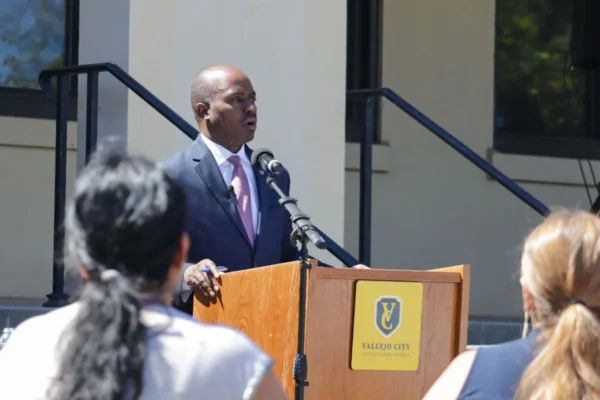
By Joe W. Bowers Jr., California Black Media
OPINION (CBM) – Vallejo City Unified School District (VCUSD) has repaid its $60 million state loan, ending 20 years of state oversight that began in 2004. The loan, caused by severe financial mismanagement, placed the district in state receivership, stripping the local board of control.
On Sept. 5, State Superintendent of Public Instruction (SPI) Tony Thurmond joined district officials to celebrate the milestone and reflect on the lessons for other struggling districts.
The $60 million VCUSD borrowed in 2004 grew to $68.5 million with interest. Reflecting on the district’s journey, Superintendent Rubén Aurelio called the repayment “a milestone of resilience and collaborative efforts.”
VCUSD Board of Education President Latyna Young, celebrating the district’s accomplishment, stated, “I was here when we took out the loan, and I’m here when we paid it back in full. It’s a blessing. We made it through the storm, and now we can see the rainbow.”
In a prior statement, SPI Thurmond praised the district’s progress, saying, “This significant milestone reflects the hard work and dedication of the district’s leadership and community, paving the way for a brighter future for all students.”
The receivership process for districts like Vallejo typically involves a loss of local control when severe financial mismanagement or insolvency occurs. A district must request a state loan, formalized through a bill passed by the legislature and signed by the governor. Once the loan is received, the district enters receivership, with an appointed trustee assuming control. The local board loses total authority over its budget and operations until the loan is repaid. Difficult choices, such as school closures and staff reductions, are overseen by the trustee.
VCUSD’s recovery involved closing or repurposing eight schools and addressing a 53% decline in enrollment over two decades. While the loan is paid, challenges such as declining enrollment and fiscal constraints remain.
Vallejo’s experience reflects the financial struggles of other districts across California, several of which are either currently in receivership or experiencing severe financial distress.
Inglewood Unified School District, for example, entered state receivership in 2012 after borrowing $29 million. The loan amount, attributed to overborrowing under state-appointed administrators, is why the district is still under state oversight. While it has made progress toward regaining local control, challenges like declining enrollment and rising operating costs persist.
Oakland Unified School District has been under state financial oversight since 2003 after borrowing $100 million. The district has implemented major cost-cutting measures, including school closures, as it works toward financial stability.
South Monterey County Joint Union High School District is still repaying a state loan, while facing budgetary constraints that require careful management and ongoing oversight as it strives for financial recovery.
Sacramento City Unified and San Francisco Unified are both facing budget deficits, rising pension costs, and declining enrollment. To help stabilize San Francisco Unified, Mayor London Breed has allocated millions and appointed a team of education and budget specialists. Meanwhile, West Contra Costa Unified recently failed to approve its Local Control Accountability Plan (LCAP), leading the Contra Costa County Office of Education to temporarily take over budget planning for the 2024-25 school year due to a projected deficit.
SPI Thurmond, a former West Contra Costa school board member from 2008 to 2012, shared his personal experience with receivership during the press conference. “I remember being a school board member during the Great Recession and being told that we could not do anything of financial consequence,” he said. “It was gratifying to return control to that district, and it is gratifying to see Vallejo regain that control.”
Dr. Ramona Bishop, who served as VCUSD Superintendent from 2011 to 2017, was instrumental in turning around the district with a student body that is 23% African American. During her tenure, the district met key Fiscal Crisis and Management Assistance Team (FCMAT) requirements, which helped return local control to the Board of Education. Her leadership played a crucial role in setting the district on a path to financial recovery.
Looking back on her tenure at VCUSD, Bishop who is CEO of ELITE Public Schools recalled finding a district where the board played a ceremonial role while a state administrator made key decisions. “I worked alongside many of the individuals that are still there, to establish an organizational structure that removed the state administrator and set the stage for the eventual payoff of the loan. I lead the team as we worked to implement FCMAT recommendations, established a strong organizational structure, and eventually the state granted the board its governance power. It is because of our work that the current board has the right to make decisions and can celebrate the payoff of the loan. I join all district board members, and staff members in celebrating this outstanding accomplishment.”
Solano County Superintendent Lisette Estrella-Henderson also commended the district’s leadership: “Congratulations on the repayment of this $60 million loan. It’s a huge milestone on your journey to continue excellence.”
While VCUSD celebrates its repayment, its story serves as a reminder of the consequences of financial mismanagement for other school districts. The receivership process provides a financial lifeline in times of crisis, but it also involves the loss of local control and challenging financial decisions. Vallejo’s experience highlights the importance of fiscal responsibility and strategic planning to avoid future financial crises.
Superintendent Aurelio concluded, “This is a new beginning for Vallejo City Unified, one where we are no longer defined by our past struggles but by our future successes.”
About the Author Joe W. Bowers Jr. is a contributing editor to California Black Media. He is a graduate of Stanford University




